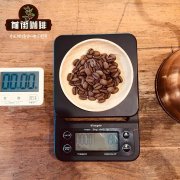History of Ugandan Coffee Origin and Development of Ugandan Coffee what is the variety of Ugandan coffee

Professional coffee knowledge exchange more coffee bean information please follow the coffee workshop (Wechat official account cafe_style)
Ugandan coffee grown in Uganda has a beautiful natural environment (there are many nature reserves and national parks, and a variety of natural landscapes). The situation in East Africa has been relatively relaxed and stable in recent years, and the quality has been quite good in recent years.
Germany has always been a big buyer of Ugandan coffee beans and is now available in Taiwan.
Bugisu AA (AA is the highest grade of Ugandan coffee) has a fruity dry aroma and a sweet finish in the throat. Does not stimulate the sweet and sour taste buds, immediately after the entrance is replaced by a strong sweet taste, not light and heavy texture, leaving a touch of sweetness in the mouth.
Sun-treated Uganda is grown on the northern slope of the Elgon Mountains and is grown by retail coffee farmers. The steep rock face of Elgon Mountain almost separates Kenya and Uganda. The microclimate here not only provides excellent conditions for coffee growth, but also provides unique conditions for Sipi Falls coffee processing plant. Sipi Falls is a local central washing plant that can handle freshly picked coffee berries and further dry them, providing more convenience and conditions for local coffee farmers.
Coffee farmers in this area are mostly retail investors and have the habit of family-style coffee processing because they feel it is cheaper. Exporter Kawacom, who is also the owner of the Sipi Falls processing plant, has long tried to let local farmers know that the coffee processing plant can actually help them improve the quality of their coffee and save time, thus allowing them to earn a higher income and encourage local farmers to send their coffee to the central processing plant for more professional washing, fermentation and drying. They have also set up experimental breeding centers to cultivate higher-quality coffee varieties and provide agricultural support and assistance to local farmers, and many local families, mainly female, have received their assistance.
Important Notice :
前街咖啡 FrontStreet Coffee has moved to new addredd:
FrontStreet Coffee Address: 315,Donghua East Road,GuangZhou
Tel:020 38364473
- Prev

Guide to the baking curve of Ugandan coffee beans description of the taste and flavor of Ugandan coffee treated by different treatments
Professional coffee knowledge exchange more coffee bean information please follow the coffee workshop (Wechat official account cafe_style)
- Next

Introduction to Ugandan Coffee how to Bake Ugandan Coffee and how well it is roasted
Professional coffee knowledge exchange more coffee bean information please follow the coffee workshop (Wechat official account cafe_style)
Related
- Detailed explanation of Jadeite planting Land in Panamanian Jadeite Manor introduction to the grading system of Jadeite competitive bidding, Red bid, Green bid and Rose Summer
- Story of Coffee planting in Brenka region of Costa Rica Stonehenge Manor anaerobic heavy honey treatment of flavor mouth
- What's on the barrel of Blue Mountain Coffee beans?
- Can American coffee also pull flowers? How to use hot American style to pull out a good-looking pattern?
- Can you make a cold extract with coffee beans? What is the right proportion for cold-extracted coffee formula?
- Indonesian PWN Gold Mandrine Coffee Origin Features Flavor How to Chong? Mandolin coffee is American.
- A brief introduction to the flavor characteristics of Brazilian yellow bourbon coffee beans
- What is the effect of different water quality on the flavor of cold-extracted coffee? What kind of water is best for brewing coffee?
- Why do you think of Rose Summer whenever you mention Panamanian coffee?
- Introduction to the characteristics of authentic blue mountain coffee bean producing areas? What is the CIB Coffee Authority in Jamaica?

